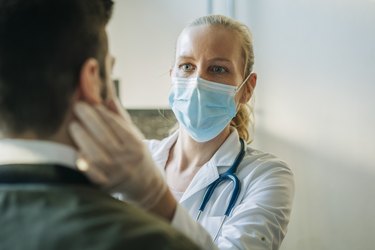
With multiple COVID vaccines available, the world is re-opening. Gyms and restaurants are resuming operations, and workplaces are sharing timetables for employees to return to the office.
Even during the height of closures and stay-at-home orders, many doctors' and dentists' offices remained open to serve patients. But now, you may be getting texts, calls and emails from your health care providers, reminding you of appointments that were skipped due to the pandemic.
Video of the Day
Video of the Day
Whether or not you're fully vaccinated, you may be wondering if you can see a doctor or dentist safely. Here's what you need to know.
Get tips on how to stay healthy, safe and sane during the novel coronavirus pandemic.
Don't Hold Off on Routine Care
During the strictest days of the shutdown, the guidance on medical appointments was clear: Avoid them whenever possible. That allowed health care workers to focus on serving people seriously ill with COVID-19.
People heard and received this message: From March 2020 through mid-July 2020, a survey found that 41 percent of respondents held off on appointments and medical care, according to results published January 2021 in JAMA Network Open.
But even at the height of the pandemic, experts recommended seeking care for urgent health problems.
"If you are having more significant symptoms, such as shortness of breath, chest pain or confusion, then it is appropriate to seek care," says Shannon Sovndal, MD, a board-certified doctor of emergency medicine and author of the book Fragile. "Don't let the fear of a virus potentially put you at risk for other serious health issues."
It's also important to keep a dentist's appointment when you experience a dental emergency (severe pain, infection or a broken tooth).
And now that vaccines are available, you don't need to restrict yourself to only urgent, essential health care.
Once you are fully vaccinated, you can do the things you used to do before the pandemic, according to the Centers for Disease Control and Prevention (CDC). That includes visits to the doctor and dentist.
Make it a priority to schedule appointments if it's been a while — continuing to hold off on care can result in missed diagnoses or preventable illnesses, according to Cedars-Sinai.
Symptoms Not to Ignore
Some serious symptoms that warrant medical attention, per Dr. Sovndal and the Mayo Clinic, include:
- Shortness of breath
- Chest pain
- Confusion
- A fever over 103 degrees Fahrenheit, or a fever that persists for several days
- Bowel movement changes that aren't typical for you, such as bloody stools or persistent diarrhea
If you’re still unsure what type of issue warrants a visit to the doctor or dentist, call and check with your health care provider for the most current information and guidelines, suggests Jason Kindrachuk, PhD, a virologist at the University of Manitoba in Canada. "This continues to be a rapidly changing situation and recommendations or procedures may change very quickly."
How to Avoid Germs if You Have to Go to a Doctor or Dentist's Office

If you are not yet vaccinated or feel leery about returning to in-person visits, telemedicine and communicating with doctors via phone and email are likely still options. Reach out to your health care provider to see what they suggest.
If you do visit doctors or dentists in person, the experience may be a bit different than medical visits prior to the pandemic. Here's what to expect — and how to prioritize your safety during in-person health appointments.
1. You May Get a Call Prior to Your Appointment
Many facilities are screening patients by phone before appointments, Dr. Sovndal says. This usually involves a brief set of questions to assess whether you've been in contact with someone infected with COVID-19 or have experienced symptoms.
"If patients have been exposed or if they are symptomatic, they are required to delay their visit to help keep everyone safe," dentist Scott Asnis, DDS, CEO and founder of Dental365, tells LIVESTRONG.com.
What's more, many health care providers are also performing temperature checks before a patient may enter the office, Dr. Sovndal adds. In some offices like Dr. Asnis's, each person on staff also records their temperature at the beginning of every shift to ensure that only healthy staff members are treating patients.
At most medical appointments, you can expect to engage in familiar social distancing habits. "Your care provider should have provisions in place to space out patients and avoid crowded waiting rooms," Dr. Sovndal says.
These social distancing practices can't hurt if you're vaccinated, and are an important way to avoid getting sick if you haven't gotten your vaccine yet.
If you feel uncomfortable, or the waiting room is too congested, Dr. Sovndal recommends that you kindly let the provider know and wait outside until it's your turn to see the doctor. Many offices are requiring you to do so; you may be instructed to call the front desk when you've arrived and then wait in your car or outside until you receive a call back letting you know it's time to enter.
And, unless the appointment is for a child or someone who needs assistance, patients should come alone. By limiting the amount of people — and potential COVID-19 carriers — in the office, "we can eliminate unnecessary bacteria and germs being spread," Dr. Asnis says.
Preventive care is still essential, even during the pandemic. For instance, children and adults should not delay vaccinations, according to the CDC.
3. Bring Your Own Pen — and Avoid Unnecessary Touching
Once you're in the office, refrain from touching common office objects that might have passed through many germy hands (think: magazines, pens or toys if you're visiting a pediatrician's office). Remember, although it's unlikely that you'll become infected with COVID-19 from touching various surfaces, the novel coronavirus can hang around on them for hours to days, per the CDC. To help facilitate this, many offices have stopped using digital check-in devices like shared tablets.
That said, "many health care facilities and doctors' offices have increased the frequency and diligence of cleaning to decrease the potential exposure to large volumes of the virus," Dr. Sovndal says.
"Reputable dental offices have always had stringent cleanliness and sanitization practices, but with the onset of the COVID-19 pandemic, our offices have implemented even greater safety and infection control protocols to help keep patients and staff members safe," Dr. Asnis adds. In his offices, they're adding air purification and filtration systems to more effectively remove airborne bacteria and viruses.
4. Wash Your Hands
As always, you'll want to wash your hands often or use alcohol-based hand sanitizers before, during and after your visit and avoid touching your face.
5. Mask Up
Medical offices may also require you to wear a mask, even if you don't feel ill or show signs of sickness. That's because asymptomatic infections may represent as much as 45 percent of all COVID-19 cases, playing a major role in the spread of the potentially deadly disease, according to a June 2020 review in Annals of Internal Medicine.
To reduce potential transmission of the coronavirus, doctors and medical office staff should also be sporting masks and, when advisable, other forms of personal protective equipment.
"When our clinical staff are working on treatments and procedures, they are required to take extra precautions by wearing N95 masks in combination with surgical masks, face shields, gowns and gloves to ensure there is no exchange of virus or bacteria between staff members and patients," Dr. Asnis says.
Again, if you have any questions about your medical or dental provider's protocols, you should visit the practice's website or contact the office directly to ask about how they are handling patient care and safety.
Concerned About COVID-19?
Read more stories to help you navigate the novel coronavirus pandemic:
- JAMA Network Open: "Reports of Forgone Medical Care Among US Adults During the Initial Phase of the COVID-19 Pandemic"
- Centers for Disease Control and Prevention: “Cleaning and Disinfection for Households”
- PNAS: “Identifying Airborne Transmission as the Dominant Route for the Spread of COVID-19”
- Annals of Internal Medicine: “Prevalence of Asymptomatic SARS-CoV-2 Infection”
- CDC: "Doctor Visits and Getting Medicines"
- CDC: "Vaccination Guidance During a Pandemic"
- World Health Organization: "Considerations for the provision of essential oral health services in the context of COVID-19"
- CDC: "When You’ve Been Fully Vaccinated"
- Cedars-Sinai: "Getting Back Into Care During COVID-19"
Is this an emergency? If you are experiencing serious medical symptoms, please see the National Library of Medicine’s list of signs you need emergency medical attention or call 911.